All Categories
Featured
Unlocking Opportunities: Comprehensive Low Vision Recovery Alternatives.
Living with low vision can provide distinct difficulties, but contemporary rehab techniques equip people to adjust and grow. From advanced modern technology to hands-on training, there are numerous alternatives designed to enhance daily life and foster independence. Here's an in-depth check out the diverse rehab services readily available for those with low vision.
The Function of Low Vision Rehab
Low vision rehabilitation focuses on assisting individuals optimize their remaining vision and develop abilities to handle their surroundings. With a mix of tools, training, and customized support, rehabilitation programs enhance functionality and increase confidence in navigating everyday activities.
Key Low Vision Recovery Options
Personalized Visual Help
High-Powered Magnifiers: These devices come in portable, wearable, or electronic formats, enabling individuals to review, compose, or sight things up close.
Telescopic Glasses: Ideal for enhancing distance vision, these glasses aid with tasks such as viewing television or analysis indications.
![]()
Filter Lenses: Tinted lenses reduce glare, improve contrast, and offer UV protection, boosting comfort and exposure.
Technical Technologies
Digital Magnifying Tools: Desktop computer and portable tools use adjustable zoom, allowing much easier accessibility to printed materials and electronic material.
![]()
Voice-Assisted Technology: Screen readers, voice-enabled mobile phones, and AI-driven applications aid individuals navigate the electronic globe a lot more effectively.
Wearable Vision Aids: Smart glasses outfitted with video cameras and auditory comments provide real-time help with reading, acknowledging things, and spatial alignment.
Professional Training Programs
Positioning and Movement Training: This program instructs individuals how to relocate with confidence within their homes and areas, often including walking sticks or guide pet dogs.
Daily Living Skills: Specialized training furnishes individuals with strategies to do important jobs such as food preparation, dressing, and taking care of house jobs.
Flexible Visual Techniques: Therapists guide clients on leveraging outer vision or scanning methods to make up for vision loss.
Ecological Adjustments
![]()
Basic adjustments in the house or job can substantially boost access:
Using contrasting colors for far better item distinction.
Adding task illumination to improve presence.
Marking devices with tactile indications for simpler procedure.
Emotional and Social Support
Dealing with vision loss usually involves emotional adjustments. Support system and counseling solutions supply a risk-free area to construct and share experiences durability.
Peer mentoring programs link individuals with similar obstacles, cultivating friendship and shared services.
Accessing Rehab Providers
Reduced vision rehabilitation services are extensively offered with:
Specialized Clinics: Optometrists and ophthalmologists learnt reduced vision care offer customized assessments and solutions.
Nonprofit Organizations: Teams like the American Structure for the Blind and VisionAware provide sources, support, and references.
Community Centers: Local services might offer totally free or inexpensive training and access to assistive tools.
Last Ideas
Low vision does not need to indicate a reduced quality of life. With the ideal mix of devices, training, and assistance, people can reclaim self-reliance and appreciate meeting lives. By checking out the various recovery alternatives available, those with low vision can locate approaches that function best for their special requirements and scenarios. If you or a loved one encounters vision difficulties, do not be reluctant to reach out to a low vision specialist to begin the journey toward empowerment and versatility.
Living with low vision can provide distinct difficulties, but contemporary rehab techniques equip people to adjust and grow. From advanced modern technology to hands-on training, there are numerous alternatives designed to enhance daily life and foster independence. Here's an in-depth check out the diverse rehab services readily available for those with low vision.
The Function of Low Vision Rehab
Low vision rehabilitation focuses on assisting individuals optimize their remaining vision and develop abilities to handle their surroundings. With a mix of tools, training, and customized support, rehabilitation programs enhance functionality and increase confidence in navigating everyday activities.
Key Low Vision Recovery Options
Personalized Visual Help
High-Powered Magnifiers: These devices come in portable, wearable, or electronic formats, enabling individuals to review, compose, or sight things up close.
Telescopic Glasses: Ideal for enhancing distance vision, these glasses aid with tasks such as viewing television or analysis indications.

Filter Lenses: Tinted lenses reduce glare, improve contrast, and offer UV protection, boosting comfort and exposure.
Technical Technologies
Digital Magnifying Tools: Desktop computer and portable tools use adjustable zoom, allowing much easier accessibility to printed materials and electronic material.

Voice-Assisted Technology: Screen readers, voice-enabled mobile phones, and AI-driven applications aid individuals navigate the electronic globe a lot more effectively.
Wearable Vision Aids: Smart glasses outfitted with video cameras and auditory comments provide real-time help with reading, acknowledging things, and spatial alignment.
Professional Training Programs
Positioning and Movement Training: This program instructs individuals how to relocate with confidence within their homes and areas, often including walking sticks or guide pet dogs.
Daily Living Skills: Specialized training furnishes individuals with strategies to do important jobs such as food preparation, dressing, and taking care of house jobs.
Flexible Visual Techniques: Therapists guide clients on leveraging outer vision or scanning methods to make up for vision loss.
Ecological Adjustments

Basic adjustments in the house or job can substantially boost access:
Using contrasting colors for far better item distinction.
Adding task illumination to improve presence.
Marking devices with tactile indications for simpler procedure.
Emotional and Social Support
Dealing with vision loss usually involves emotional adjustments. Support system and counseling solutions supply a risk-free area to construct and share experiences durability.
Peer mentoring programs link individuals with similar obstacles, cultivating friendship and shared services.
Accessing Rehab Providers
Reduced vision rehabilitation services are extensively offered with:
Specialized Clinics: Optometrists and ophthalmologists learnt reduced vision care offer customized assessments and solutions.
Nonprofit Organizations: Teams like the American Structure for the Blind and VisionAware provide sources, support, and references.
Community Centers: Local services might offer totally free or inexpensive training and access to assistive tools.
Last Ideas
Low vision does not need to indicate a reduced quality of life. With the ideal mix of devices, training, and assistance, people can reclaim self-reliance and appreciate meeting lives. By checking out the various recovery alternatives available, those with low vision can locate approaches that function best for their special requirements and scenarios. If you or a loved one encounters vision difficulties, do not be reluctant to reach out to a low vision specialist to begin the journey toward empowerment and versatility.
Latest Posts
Reasons Consistent Vehicle Maintenance at Montclare Auto Repair Saves You Money
Published May 28, 25
1 min read
Explore Montclare Auto Repair’s Most Popular Car Care Solutions and Why Drivers Choose Them
Published May 24, 25
1 min read
Uncover the Greatest Auto Repair Coupons in Montclare, Chicago
Published May 23, 25
1 min read
More
Latest Posts
Reasons Consistent Vehicle Maintenance at Montclare Auto Repair Saves You Money
Published May 28, 25
1 min read
Explore Montclare Auto Repair’s Most Popular Car Care Solutions and Why Drivers Choose Them
Published May 24, 25
1 min read
Uncover the Greatest Auto Repair Coupons in Montclare, Chicago
Published May 23, 25
1 min read